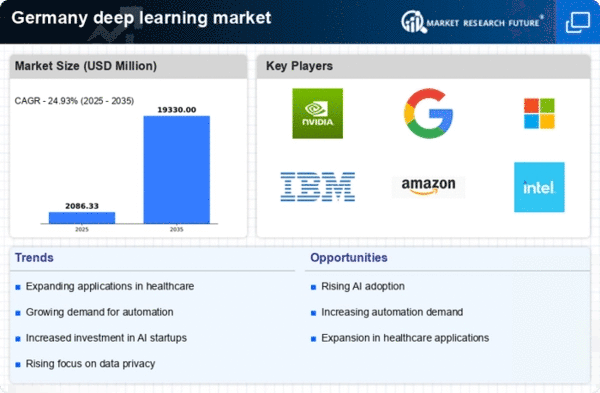Growing Data Availability
The availability of vast amounts of data is a crucial driver for the deep learning market in Germany. With the proliferation of IoT devices and digital platforms, organizations are generating unprecedented volumes of data. This data serves as the foundation for training deep learning models, enabling more accurate predictions and insights. In 2025, it is estimated that data generation in Germany will reach approximately 50 zettabytes, providing a rich resource for deep learning applications. Consequently, the deep learning market industry is positioned to thrive as businesses harness this data to develop innovative solutions and improve decision-making processes.
Advancements in AI Research
Germany is at the forefront of artificial intelligence research, which significantly impacts the deep learning market. The country boasts numerous research institutions and universities that are dedicated to advancing AI technologies. Recent investments in AI research have reached approximately €3 billion, aimed at fostering innovation and collaboration between academia and industry. This influx of funding is likely to accelerate the development of new deep learning models and applications, enhancing the capabilities of existing technologies. As research progresses, the deep learning market industry in Germany is expected to benefit from cutting-edge advancements, leading to more sophisticated solutions across various sectors.
Rising Demand for Automation
The deep learning market in Germany is experiencing a notable surge in demand for automation across various sectors. Industries are increasingly adopting deep learning technologies to enhance operational efficiency and reduce human error. For instance, the manufacturing sector is leveraging deep learning algorithms for predictive maintenance, which can lead to a reduction in downtime by up to 30%. This trend is indicative of a broader shift towards smart factories, where automation is not just a luxury but a necessity. As companies strive to remain competitive, the integration of deep learning solutions is becoming essential. The deep learning market industry is thus poised for substantial growth, driven by the need for automation and efficiency.
Increased Focus on Cybersecurity
As cyber threats continue to evolve, the deep learning market in Germany is witnessing a heightened focus on cybersecurity solutions. Organizations are increasingly turning to deep learning algorithms to enhance their security measures, enabling real-time threat detection and response. The market for AI-driven cybersecurity solutions is projected to grow by 25% annually, reflecting the urgent need for advanced protection mechanisms. This trend underscores the importance of deep learning technologies in safeguarding sensitive information and maintaining trust in digital systems. The deep learning market industry is thus likely to expand as businesses prioritize cybersecurity in their operational strategies.
Government Initiatives and Funding
The German government is actively promoting the adoption of deep learning technologies through various initiatives and funding programs. With a commitment to digital transformation, the government has allocated significant resources to support AI development, including deep learning. In 2025, funding for AI projects is projected to exceed €1 billion, aimed at fostering innovation and enhancing competitiveness. These initiatives not only encourage private sector investment but also facilitate collaboration between startups and established companies. As a result, the deep learning market industry is likely to witness accelerated growth, driven by supportive government policies and financial backing.
















